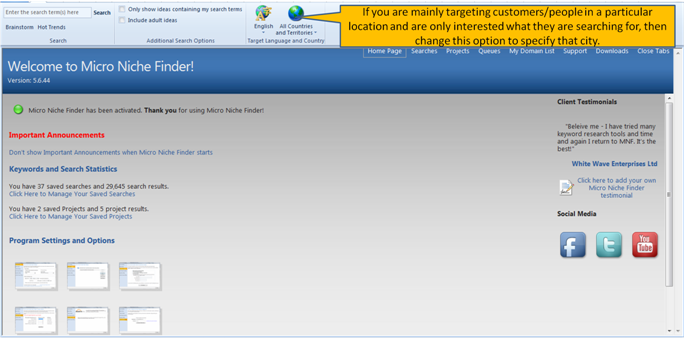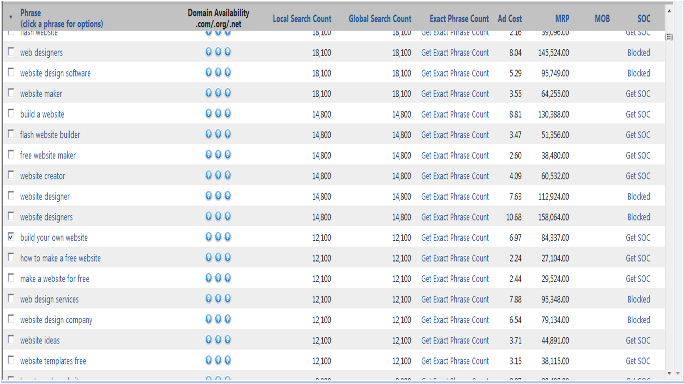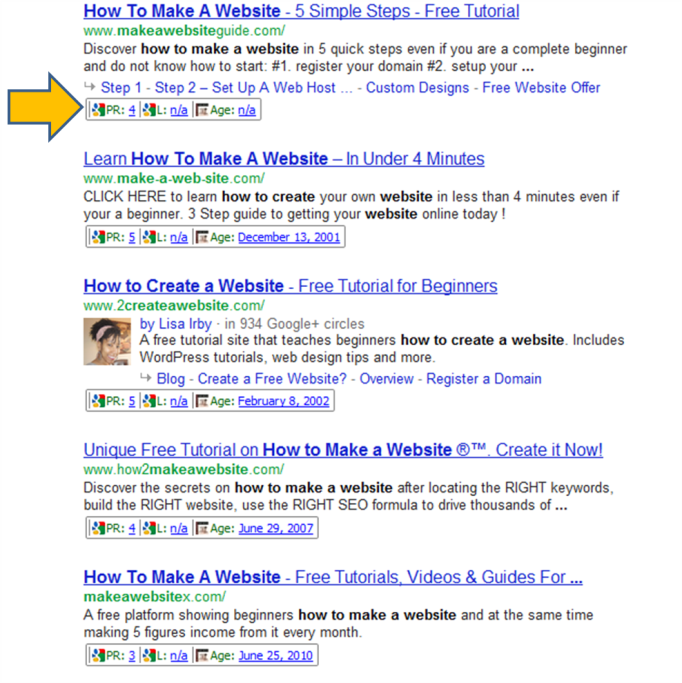 In my last post, I explained the importance of keyword research and why it is essential. To take it forward from there, I want to share the process I follow when doing keyword analysis.
In my last post, I explained the importance of keyword research and why it is essential. To take it forward from there, I want to share the process I follow when doing keyword analysis.
To help illustrate the points I talk about, I’ll show you an example of research for a person who is planning to launch a website, that provides information on how to build websites. I entered the words ‘building a website’ into one of my favourite keyword research tools - Micro Niche Finder, which is a paid software you can download to your computer. I think it’s a great tool, because it’s affordable, quick, easy and has given me results time and again.
Here’s what the home screen for Micro Niche Finder looks like. To get started you simply need to enter the topic you want to research, which is ‘building a website’ in this case:

The software then returns a list of related words that people have actually used in search engines, along with information on number of searches and the amount of competition:


A few points to note and my thought process for selecting keywords to use:
- I find it’s best to use the ‘Exact’ match option. Without going into too much detail, what this does is to show the whole/exact keyword people are searching for, rather than just part or a variation of the term.
- The ‘Search Count’ shows how many times in a month people searched the internet, for each keyword. As a general guideline - if I’m not targeting users in a particular location, then I consider keywords which have more than 10,000 monthly searches. If I’m targeting people in a specific city, like Singapore for example, then I look at terms with much lower volume as well. How much lower depends on the amounts in question - for example, if I’m selling professional service that costs $1,000 and my aim is to get 4-5 sales per month, then I might consider keywords which have above 2,000 monthly searches (assuming that I can attract 500 of those searches/people to my website and convert 1% of these visitors into paying customers).
- The ‘Ad Cost’ is another interesting figure. It tells you how much individuals/companies are willing to pay, for showing their advertisements to people who search for a particular keyword. This is a good indication of the amount of money there is to be made in that area.
- I select keywords which are related to my topic and have the right amount of monthly searches and Ad cost. In this case, I selected - how to make a website, make your own website, creating a website, how to build a website and build your own website.
- In my experience it is better to pick terms with more than 2-3 words. This is because they are more targeted and it’s easier to rank higher in the search engines and also to market your website, with more specific keywords.
The next step is to check how much competition there is for my selection of keywords. This is important since you don’t want to go after keywords for which the competition is so great, that you can’t achieve high rankings in search engines, no matter what you do. The SOC (Strength of Competition) column in the Micro Niche Finder results, does some calculations and lets you know how hard it will be to rank high for a keyword. I think their estimate is very conservative though, so I supplement it with another way to judge the competition. I have the SEO Quake toolbar installed on my browser, which provides the data that will help me make an assessment of the competition. I do a quick search in Google, using my short-listed keywords. Here is part of the results for the keyword ‘how to make a website.’

The bar that you see under each website with PR/L/Age is what SEO Quake provides. PR (Page Rank) is the most interesting figure and it’s an indication of how important Google thinks the website is and also the general strength of the site. The higher the PR, the stronger the website. If all the websites on the first page are PR4-5 and above, then I tend to stay away. If there are some websites which are PR2-3 (like in the picture above), then I give it a shot and think it’s possible to reach the first page (using proper search optimisation techniques, a lot of hard work on a consistent basis and some luck). In addition to PR, I also take into account the quality of the websites. If there are a few which are very low on content and not very impressive overall, then that makes it easier, because the quality is low.
Based on this thought process, the competition for the website/keywords looks pretty tough. I would not enter the space unless I could devote a huge amount of time, effort and money to establish the website.
Now, will this keyword research process work for you. That depends on your situation and if you don’t mind spending a small amount of money on a process which is quick, easy and reliable.
You can do research using other tools like the Google Adwords Keywords Tool (which is free) or Market Samurai. However, I don’t like the Google tool because I used it for some of my websites initially and then after using Micro Niche Finder discovered that the Google tool did not suggest some very important keywords and provided some misleading numbers as well. This gap was quite big when I searched for keywords used in locations outside of major markets like USA/UK (such as Singapore) but not so much for Global/USA/UK markets. I could be wrong and maybe this was specific to my situation but after I made adjustments to some of my websites/marketing using data from Micro Niche Finder, I really hit the sweet spot and got many more visitors from those keywords.
So I think that if you really don’t want to spend money on a keyword research tool, then that’s fine as long as you’re going after the Global/USA/UK market. Have a look at the suggestions in the Google Adwords Keyword Tool and then check the Page Rank of competing websites. But if you’re targeting specific markets other than USA and UK, then consider investing in Micro Niche Finder. Market Samurai is a good tool as well but it’s more expensive and I found that it took too much of my time. This is because it has too many steps/options and takes a while to load all the data. People like the Competition Analysis feature, where you can see the amount of backlinks, domain age, etc. for competing websites but I prefer my Page Rank method for keyword research.
Amit Puri - Managing Consultant, Sandbox Advisors
Latest posts by Amit Puri - Managing Consultant, Sandbox Advisors (see all)
- Great tips for public speaking and presentations [Infographic] - September 5, 2014
- Importance of continuing education for careers - September 5, 2014
- Overview of how to find a job in Singapore quickly - September 5, 2014



